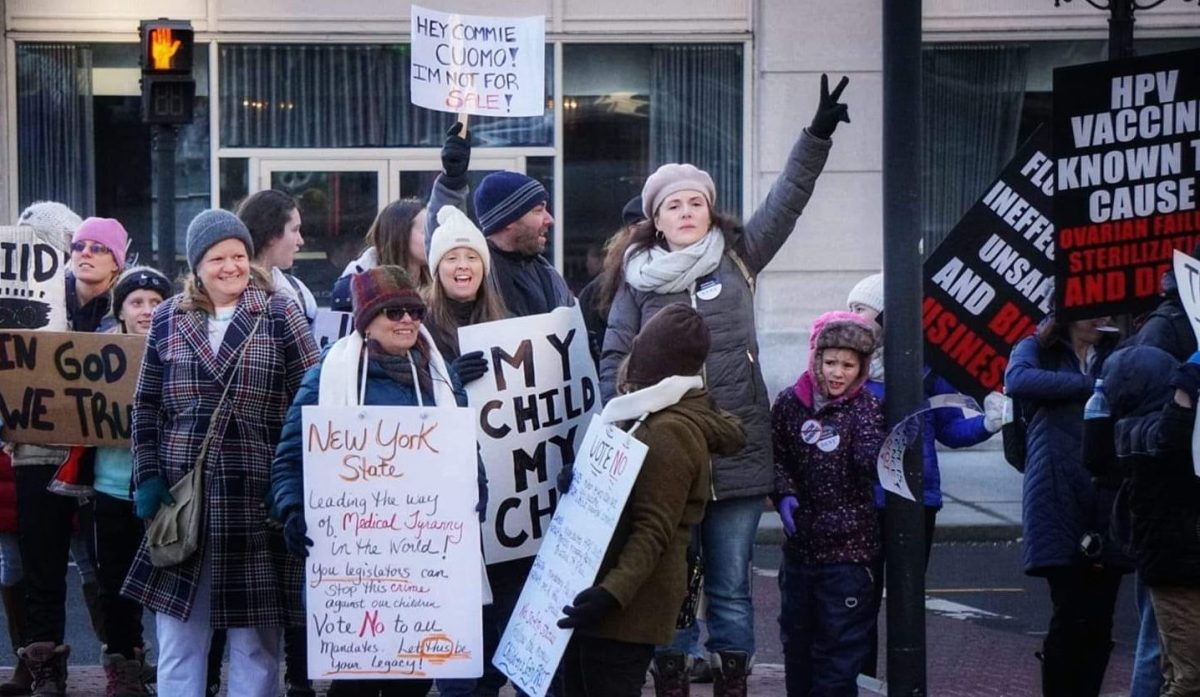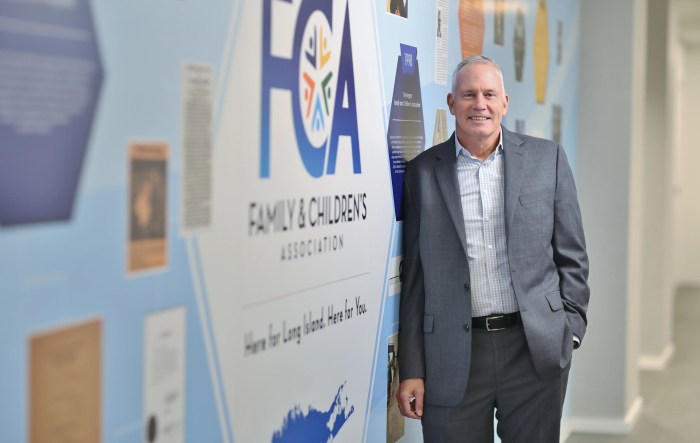Long Island parents were among an estimated 1,000 protesters who picketed on Jan. 8 outside the New York State Capitol in Albany to rally against a pair of proposals that would mandate students to get additional vaccines to attend school.
If passed, the bills would require an annual flu vaccine for minors from age 2 months to 18 years and require the HPV vaccine for all children born on or after January 1, 2009. Supporters of the bills say the mandates are necessary for public health. Opponents say the science is not settled as to the vaccines’ safety and the government is interfering in parents’ medical decisions for their children.
”Many children in daycares and preschools are exposed to daily close contact with other young and possibly ill children,” state Sen. Brad Hoylman (D-Manhattan) wrote in his sponsor memo for the flu bill. “Often children of this age group are too young to have been properly taught to cough properly and protect themselves from disease. Vaccination is the best way to make sure our youth is protected.”
According to the U.S. Centers for Disease Control and Prevention (CDC), the flu vaccine can reduce flu illness in up to 60 percent of the general population, depending on how well the current, circulating flu virus is matched to the current flu vaccine virus. Influenza vaccine effectiveness for all vaccine types against influenza A or B for 2019 to 2020 was 48 percent for children ages 6 months to 8 years and 7 percent for children ages 9 to 17, says the CDC.
“Children at that age are at high risk for complications and more likely to transmit influenza,” says Dr. Jana Shaw, chair of public education for the New York State HPV Coalition and an associate professor of Pediatrics at SUNY Upstate Medical University. “The flu vaccine is not perfect but it’s better than nothing.”
The benefits outweigh the risks, she says. But skeptics remain. Critics note that the flu shot has the most complaints filed with the Vaccine Adverse Event Reporting System (VAERS), a federal program for vaccine safety, co-managed by the CDC and the U.S. Food and Drug Administration (FDA).
“Flu vaccines like all other federally recommended vaccines, are inadequately tested,” says Mary Holland, general counsel of Children’s Health Defense and co-author of HPV Vaccine on Trial: Seeking Justice for a Generation Betrayed. “They’re not tested against true inert placebos and not tested over a long period of time. We know that many flu vaccines contain mercury and aluminum — known neurotoxins.”
Sen. Hoylman is also sponsoring the HPV bill.
“Human papillomavirus is an incredibly common sexually transmitted infection that can be passed on even when an infected person is asymptomatic, and can cause genital warts or cancer,” he says in his sponsor memo for the HPV bill.
According to the CDC, the numbers of cases and the number of deaths from cervical cancer have decreased significantly in the past 40 years, due mostly to women getting regular Pap tests, which can identify cervical precancer.
Dr. Shaw says the HPV vaccine can prevent that precancer — HPV infection — and cancer in the future.
“Most of the infections happen early in life,” she says. “You can be infected with HPV. You will have no symptoms and no idea you are infected and then you will go on developing cancer.”
An annual Pap smear and consistent medical care — not the HPV vaccine, Gardasil 9 — are the safest and most effective means of preventing cancer, critics say. According to VAERS, more than 60,000 serious injuries and more than 500 deaths were reported from the HPV vaccine as of October 14, 2019.
“The HPV vaccine has never been proven to prevent a single case of cancer ever,” Holland says. “The clinical trials to license Gardasil 9 were grossly inadequate and fraudulent. The injuries and deaths from the HPV vaccine are real. No parent knowing the real risks would choose to give it to their child.”
Bills that would permit minors to receive this vaccine without parental knowledge or consent “are unethical and violate the principle of informed consent,” she adds.
New York State Assemblyman David DiPietro (R-Erie County) says the proposed mandates are an example of government overreach and the pharmaceutical industry flexing its muscle, as he suggests was the case in 2019, with the controversial repeal of religious exemptions for vaccines for students in the wake of the measles outbreak.
“It’s not a coincidence that on June 13 — our last day in session — we passed this bill and then on June 14 when we were not in Albany, the [pharmaceutical] company Merck drops 48 million in New York State,” DiPietro says.

































